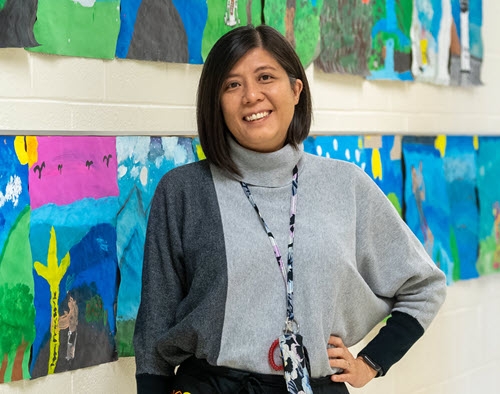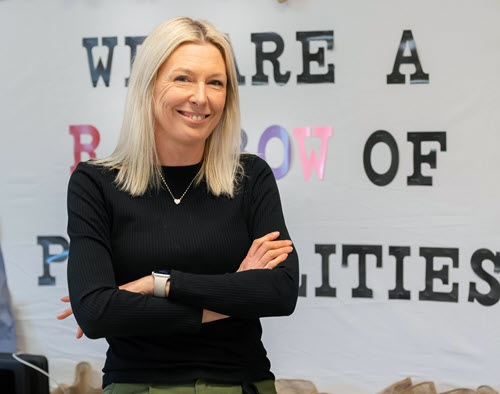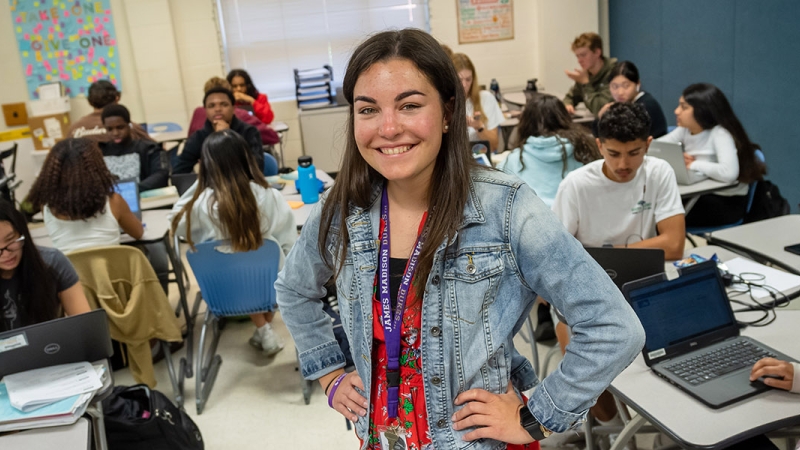Special Education Information Sessions for Prospective Teacher Candidates
Join us for one of our upcoming special education teacher information sessions, where you can learn about the benefits of becoming a special educator in FCPS!

Let us help you make a difference in the lives of students. Come to us with your compassion and creativity, and Fairfax County Public Schools (FCPS) will offer you the resources and opportunities you need to succeed. We can help you shape a fulfilling, purposeful, and lifelong career.
How do you work best--in small groups, a self-contained classroom, an inclusive classroom with co-teaching, or another model? FCPS has a variety of work environments available.
Join us for one of our upcoming special education teacher information sessions, where you can learn about the benefits of becoming a special educator in FCPS!
For Special Education Preschool Home Teachers, please send a resume and cover letter to one or more of our special education preschool home centers.
Catherine Lee had a successful career in marketing at a financial institution in Hong Kong, but knew her family needed to make a change in order to support her young son who has special needs. She and her husband searched across the U.S. for a school district with top-tier special education programs, landing on Fairfax County.

After 25 years as a physical education teacher, this year Kirsten Birge went back to school herself, in order to support and assist her special education students in a new way. While working toward licensure, she has moved from the gymnasium to the classroom; from being an adapted physical education teacher, to a role as a multiple disabilities teacher.

Meet Mr. Jae Lee (or Coach Lee), a Multiple Disabilities Teacher and Cat B Department Chair at Annandale High School and a beloved member of the Atoms community.
Transitioning to teaching can seem overwhelming at first, but the result is a rewarding career that makes a meaningful difference in the lives of students with disabilities. Learn more below about becoming a special education teacher with us!
To become a special education teacher you will need to qualify for a provisional teaching license. This means you must have at least a bachelor’s degree in any area, you must have taken or be willing to take an introduction to special education course, and you must commit to continuing your education to meet full licensure requirements.
Once hired by FCPS as a full-time, contracted employee, you are eligible for tuition reimbursement and any other supports and initiatives available.
Some special education teachers work in partnership with general education teachers and provide instruction for students who access the general education curriculum. This means that they teach students with high-incidence disabilities or those disabilities that occur more often, like learning disabilities or attention deficit disorder. These special education teachers are licensed in “Students Accessing the General Curriculum,” which means they are teaching the same standards all students learn, but in a different way.
The Grow Your Own Program helps train many special education teachers. In the video, you'll hear program participants talk about how they get help with school tuition and personal coaching. Plus, they work together in groups to support each other.

Making the transition to teaching can seem overwhelming at first, but the end result is a rewarding career that makes a meaningful difference in the lives of students with disabilities. Learn more about becoming a special education teacher with us!

Interested in pursuing careers in K-12 teaching but still working toward your credentials? We have the opportunity for you!

Resources to help guide prospective candidates obtain an instructional license in Virginia.

View our career opportunities, current job openings, salary and benefits information, and recruitment events. Learn about instructional licensure. Find out why you should become part of the FCPS team!

The Special Education and 504 Newsletter, from the Department of Special Services, provides updated information, tips and ideas to support families.

FCPS offers a wealth of opportunities for professionals transitioning from federal and state government roles into the public education sector. Your dedication to public service makes you a strong candidate for both educational and operational positions. By joining FCPS, you can continue making a…